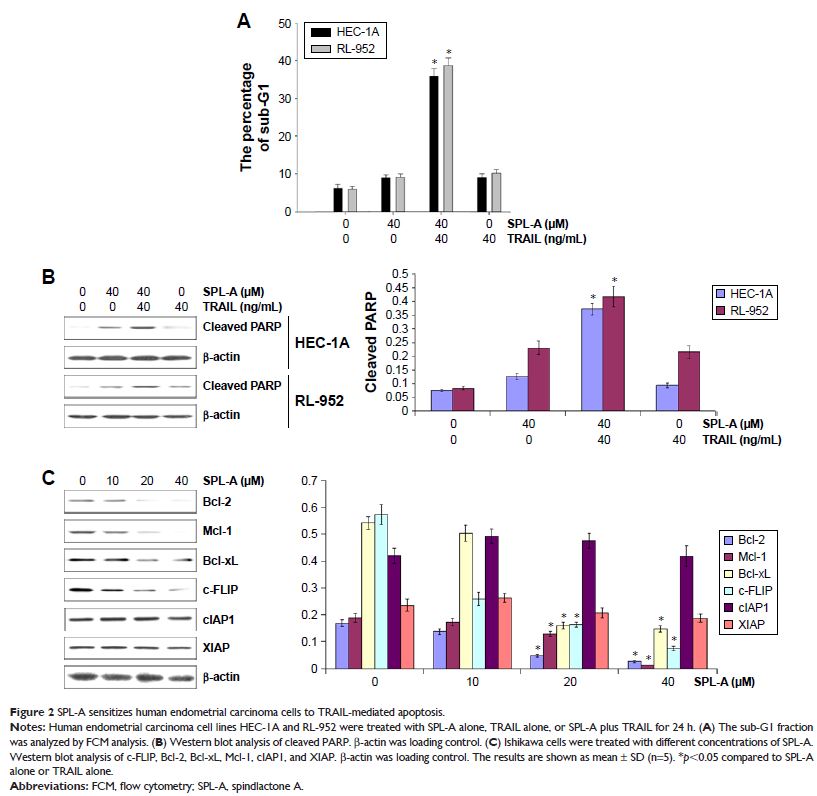108605
论文已发表
注册即可获取德孚的最新动态
IF 收录期刊
- 3.4 Breast Cancer (Dove Med Press)
- 3.2 Clin Epidemiol
- 2.6 Cancer Manag Res
- 2.9 Infect Drug Resist
- 3.7 Clin Interv Aging
- 5.1 Drug Des Dev Ther
- 3.1 Int J Chronic Obstr
- 6.6 Int J Nanomed
- 2.6 Int J Women's Health
- 2.9 Neuropsych Dis Treat
- 2.8 OncoTargets Ther
- 2.0 Patient Prefer Adher
- 2.2 Ther Clin Risk Manag
- 2.5 J Pain Res
- 3.0 Diabet Metab Synd Ob
- 3.2 Psychol Res Behav Ma
- 3.4 Nat Sci Sleep
- 1.8 Pharmgenomics Pers Med
- 2.0 Risk Manag Healthc Policy
- 4.1 J Inflamm Res
- 2.0 Int J Gen Med
- 3.4 J Hepatocell Carcinoma
- 3.0 J Asthma Allergy
- 2.2 Clin Cosmet Investig Dermatol
- 2.4 J Multidiscip Healthc

小化合物 spindlactone A 通过抑制 NAD(P)H 脱氢酶醌 1 使人子宫内膜癌细胞对由 TRAIL 诱导的细胞凋亡产生敏感性
Authors Zhao XZ, Wu XH
Received 16 February 2018
Accepted for publication 12 May 2018
Published 21 June 2018 Volume 2018:11 Pages 3609—3617
DOI https://doi.org/10.2147/OTT.S165723
Checked for plagiarism Yes
Review by Single-blind
Peer reviewers approved by Dr Cristina Weinberg
Peer reviewer comments 2
Editor who approved publication: Dr Yao Dai
Introduction: Spindlactone A (SPL-A) is a novel small molecule inhibitor of
TACC3 that selectively inhibits the nucleation of centrosome microtubules and
induces mitotic arrest in ovarian cancer cells. SPL-A is derived from
dicoumarol which inhibits the activity of NAD(P)H dehydrogenase quinone
oxidoreductase 1 (NQO1). This study aimed to investigate the mechanism by which
SPL-A enhances TRAIL-induced apoptosis in endometrial carcinoma cells.
Materials and
methods: Endometrial carcinoma cells were
treated with SPL-A and/or TRAIL, and the apoptosis and protein expression in
the treated cells were examined.
Results: Combined treatment with SPL-A and TRAIL significantly induced
apoptosis in various human endometrial carcinoma cells, but not in normal human
endometrial stromal cells and endometrial epithelial cells. Notably, both NQO1
inhibitor ES936 and NQO1 siRNA enhanced TRAIL-induced apoptosis of endometrial
carcinoma cells. Furthermore, SPL-A downregulated the expression of c-FLIP,
Bcl-2, Bcl-xl, and Mcl-1, while increasing p53 expression.
Conclusion: In particular, luciferase assay showed that SPL-A inhibited Bcl-2
promoter activity, and p53 inhibitor PFT-α could reverse the effect of SPL-A on
Bcl-2 expression. Moreover, Bcl-2 overexpression inhibited the apoptosis induced
by SPL-A and TRAIL. Taken together, our results suggest that SPL-A sensitizes
endometrial cancer cells to TRAIL-induced apoptosis via the regulation of
apoptosis-related proteins and the inhibition of NQO1 activity.
Keywords: dicoumarol derivative, SPL-A, endometrial carcinoma, TRAIL, Bcl-2,
apoptosis, NQO1
